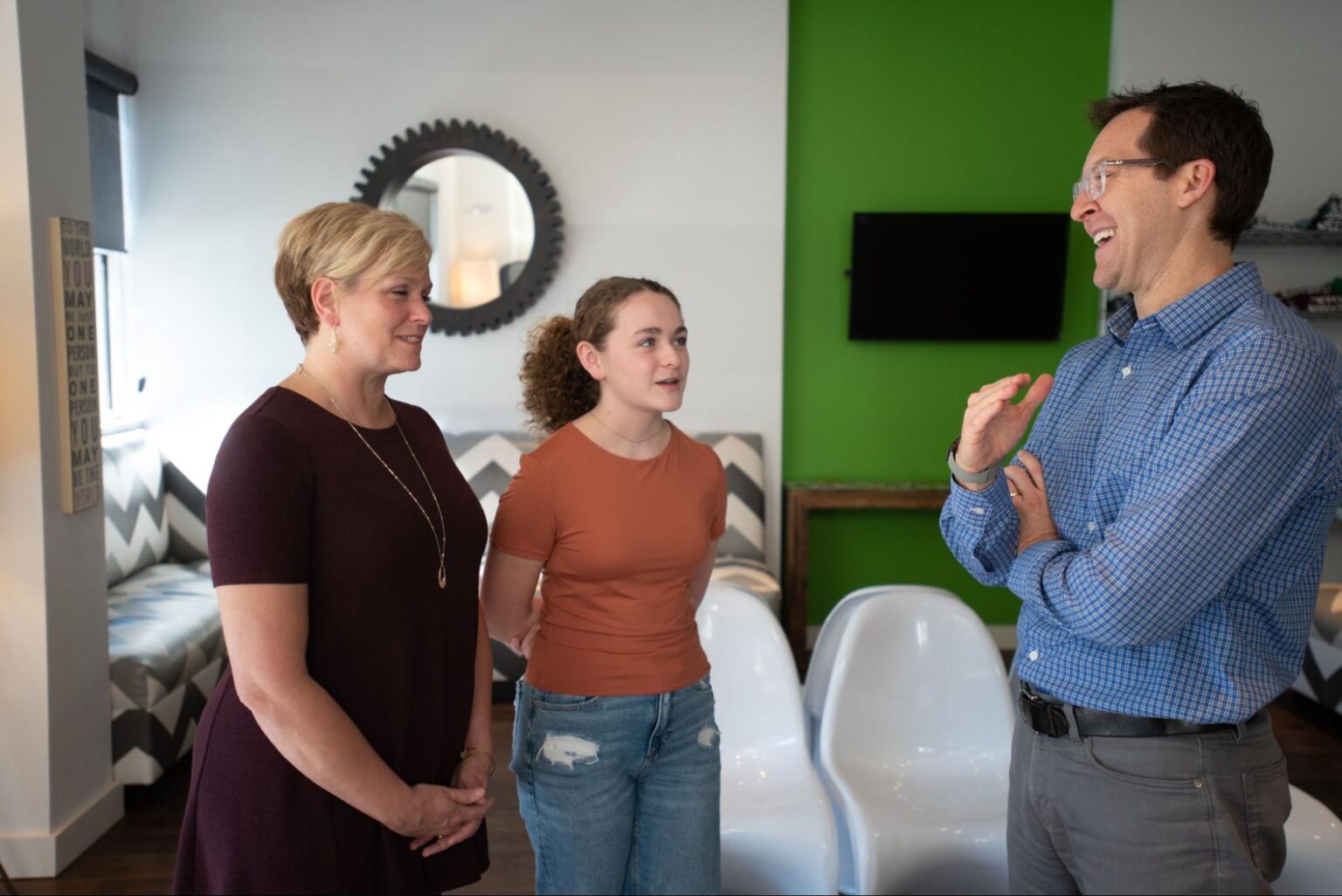Many adults and children find excuses to postpone orthodontic care because they are concerned that braces will be painful and uncomfortable. It’s a myth that has deterred people from seeking life-changing treatment for years, no doubt fueled by their bulky appearance in past designs and the idea that moving your bones has to be unbearable. At Hunter Family Orthodontics, we understand why you might believe this, but we also don’t want you to be afraid to receive the care you need. We want to change the question from “Do braces hurt?” to “How do I get started?” To do that, we’re going to tell you all about braces.
What are the different types of braces?
Braces come in two categories, fixed or removable. These two categories then break up into subcategories based on type or brand.
Fixed Braces
Fixed braces are made of brackets, wires, and sometimes ligatures (the elastic that holds the wire to the bracket). The brackets are attached to the teeth using orthodontic glue, making them “fixed” to the teeth. These are what people typically picture when they think of braces. Only an orthodontic professional, like Dr. Hunter, can remove these.
Fixed braces allow Dr. Hunter to have maximum control over your teeth’s movement, and their strength enables them to easily handle orthodontic accessories, such as orthodontic bands for jaw alignment. Because they can handle cases ranging from mild to severe, they are the go-to option for most patients and doctors.
At Hunter Family Orthodontics, we offer traditional metal braces and ceramic braces. Metal braces use a mix of strong metals (such as stainless steel) to make their brackets, and ceramic braces use a polycrystalline combination. Ceramic braces offer patients a subtle appearance by creating the illusion of clear braces, which is how they got their nickname! Though they are less fragile than their name suggests, they are not as robust as their metal predecessor and require a little more upkeep. Because of that, we recommend them for adults and older teenagers.
You must modify your diet and oral hygiene routine to accommodate fixed braces. While the changes can seem challenging at first, we promise they are only temporary, and following the guidelines can quickly lead you to your new smile and guarantee better results.
Removable Braces
As the name suggests, removable braces can be removed by the patient. These are also commonly known as clear aligners, and they offer you the most freedom during care because you will not need to change your diet or oral hygiene routine except for cleaning your aligners daily. Their custom design and snug fit make them almost undetectable to others, so most won’t even realize you’re wearing them. However, they require you to play a more active role in treatment because you have to ensure you wear your trays for twenty-two hours a day and follow your tray schedule closely.
How do they work?
Braces work by applying gentle pressure to your teeth. This pressure activates a process called “bone remodeling,” which is, in short, the breaking down and reabsorption of bone to allow for teeth movement and stabilization once in their new, permanent positions.
Does this hurt?
Whether you get fixed or removable braces, your mouth will likely be uncomfortable initially as your gums, teeth, cheek, and tongue become accustomed to having a foreign object rubbing against them and being in the way. The friction might cause some irritation, but most patients quickly become used to it and don’t notice it after even a few days.
Every few weeks after your initial installment, teeth movement will be created by tightening the wire or putting in a new tray. Your mouth will probably feel sore for a few days after.
Please understand that we do not use “uncomfortable” and “soreness” as synonyms for pain! Slight discomfort and aches are completely normal throughout treatment. We are moving your teeth, after all! Unless you have suffered from facial trauma or injury, your braces broke, or your clear aligners are deformed or ill-fitting, there should not be any pain. If you are feeling abnormal pain and there is no apparent cause, contact Hunter Family Orthodontics immediately so we can schedule an appointment and get you back on track!

Visit Hunter Family Orthodontics for more information!
We encourage you to schedule a free consultation at our The Woodlands office to learn which treatment you qualify for! There’s nothing to be worried about—braces are more comfortable than ever, and the assessment is commitment free!
If you’re still not entirely “sold” on the idea, that’s alright, too! Hunter Family Orthodontics is here to help! Feel free to contact us and ask us any questions you may have. When you’re ready, one of our helpful and kind team members will assist you in scheduling your free consultation!

